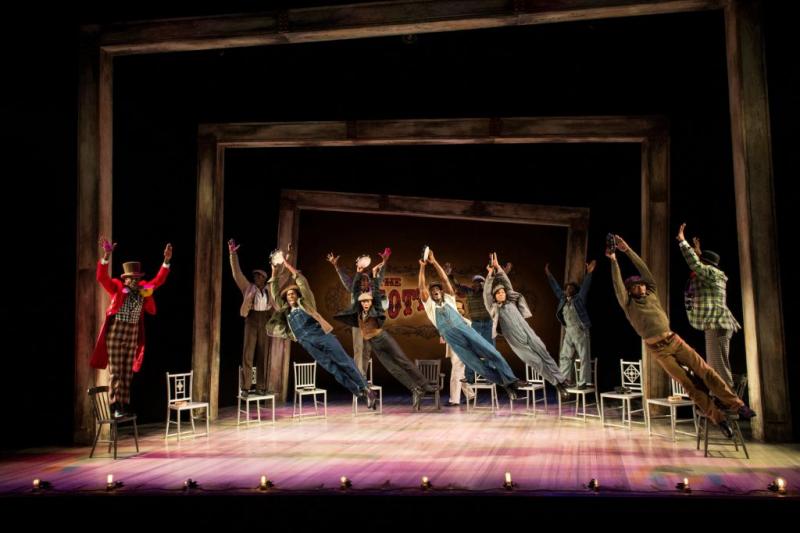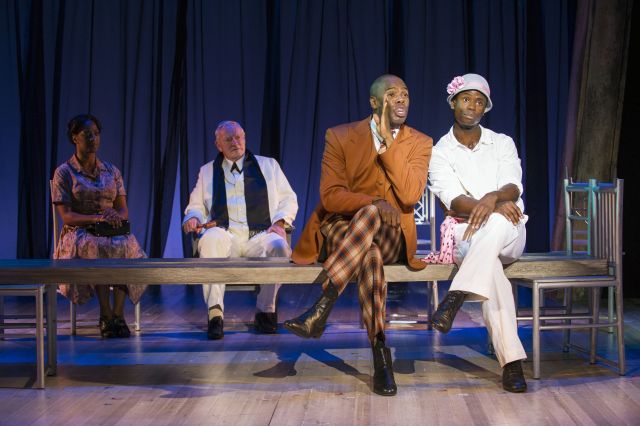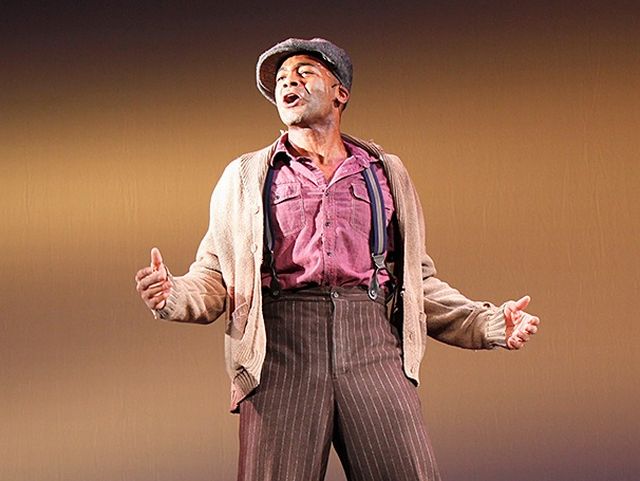The Scottsboro Boys, Garrick Theatre | reviews, news & interviews
The Scottsboro Boys, Garrick Theatre
The Scottsboro Boys, Garrick Theatre
Kander & Ebb's startling, stirring musical gets a West End upgrade

You come away from The Scottsboro Boys sure of two things: that the next cakewalk you hear will induce queasiness and that the show's director/choreographer Susan Stroman is some kind of genius. This kick-ass West End premiere, now happily transferred from the Young Vic, has a simplicity, a precision, a visceral energy, a choreographic razzle-dazzle that make an art of catching you off-guard.
OK, so this story from the dark ages of racial inequality is sadly not so familiar, but what makes this treatment of it so potent and ultimately so uplifting is the context that masters of musical satire John Kander and Fred Ebb and their book writer David Thompson give it. Kander and Ebb's last show together delivers a decisive sucker punch not by inviting us to "come to the cabaret" or to be complicit in the consequences of "all that jazz" but by inviting us to cakewalk our way to that much-loved celebration of racial degradation - the minstrel show - where the Scottsboro boys will kick up their heels, bang their tambourines, and tell their desperate story with jubilant relish.
All the while, their presiding puppeteer - the whiter-than-white Interlocutor (the frighteningly genial Julian Glover, second from left in the picture below) - pulls the strings and turns the grotesque parody of black-face on its head by cynically commandeering four of their number to assume the identities of their accusers and their persecutors.
 It is for sure a twist-and-a-half to have two young black men - the excellent Dex Lee and James T Lane - assume the airs of two lily-white southern belles, Victoria Price and Ruby Bates, whose charges of rape set the whole horrow show rolling. And then to add insult to injury by having the virtuosic Colman Domingo and Forrest McClendon act out a gallery of brutal (but oh, so comic) law enforcement officers and incompetent defence lawyers. But that's all part of the "entertainment" in which we the audience are made complicit by simply enjoying it so much. When the Interlocutor says sit, the boys sit; when he says jump, they jump; and when he says, "let's do the cakewalk" (his favourite), they oblige - for a time. As the statistics of injustice rise in hair-raising disbelief, their willingness to participate will surely dissipate. Won't it?
It is for sure a twist-and-a-half to have two young black men - the excellent Dex Lee and James T Lane - assume the airs of two lily-white southern belles, Victoria Price and Ruby Bates, whose charges of rape set the whole horrow show rolling. And then to add insult to injury by having the virtuosic Colman Domingo and Forrest McClendon act out a gallery of brutal (but oh, so comic) law enforcement officers and incompetent defence lawyers. But that's all part of the "entertainment" in which we the audience are made complicit by simply enjoying it so much. When the Interlocutor says sit, the boys sit; when he says jump, they jump; and when he says, "let's do the cakewalk" (his favourite), they oblige - for a time. As the statistics of injustice rise in hair-raising disbelief, their willingness to participate will surely dissipate. Won't it?
Kander and Ebb's songs strut and sizzle through the action (hell, let's celebrate the electric chair), not so much picking up cues as creating them: a piquant soundtrack of 1930s southern spice from a band with edge and a whole lot of attitude (musical director, Phil Cornwell). There's an unsettling close-harmony number, "Southern Days", which start out like a gently parodic evocation of the Deep South from the white man's perspective but casually, shockingly, turns on itself with a vision of burning crosses and dangling bodies.
 And there's an achingly beautiful ballad. "Go Back Home", movingly attended by Brandon Victor Dixon's dignified Haywood Patterson whose creed, "I don't tell people stories, I tell the truth" is the most supreme irony of all in that it is his voice that eventually shines through the decades. His is the voice of an illiterate who refused to trade admission of guilt for freedom but instead learned to read and write and found within himself the words to carry his truth for all eternity. (Dixon pictured left, by Johan Persson)
And there's an achingly beautiful ballad. "Go Back Home", movingly attended by Brandon Victor Dixon's dignified Haywood Patterson whose creed, "I don't tell people stories, I tell the truth" is the most supreme irony of all in that it is his voice that eventually shines through the decades. His is the voice of an illiterate who refused to trade admission of guilt for freedom but instead learned to read and write and found within himself the words to carry his truth for all eternity. (Dixon pictured left, by Johan Persson)
The final queasy twist in this knockout show is the sorry spectacle not of white performers in black-face, which would be (and was) heinous enugh, but of black performers in black-face: a truly shocking parody of their very selves. But it's also the last frontier and, show now over, the performers wipe the grotesque make-up from their faces while the Interlocutor is left floundering as to why they don't hear, let alone obey, him any more.
Throughout the musical, a mysterious woman called simply the Lady (the appropriately named Dawn Hope) - mother of all black sons, an embodiment of black pride - pervades the action. And it is her words - her only words, as few as they are emphatic - that signal the moment of change and bring hope to this paradoxically bleak but also exhilarating tale.
rating
Buy
Explore topics
Share this article
The future of Arts Journalism
You can stop theartsdesk.com closing!
We urgently need financing to survive. Our fundraising drive has thus far raised £49,000 but we need to reach £100,000 or we will be forced to close. Please contribute here: https://gofund.me/c3f6033d
And if you can forward this information to anyone who might assist, we’d be grateful.

Subscribe to theartsdesk.com
Thank you for continuing to read our work on theartsdesk.com. For unlimited access to every article in its entirety, including our archive of more than 15,000 pieces, we're asking for £5 per month or £40 per year. We feel it's a very good deal, and hope you do too.
To take a subscription now simply click here.
And if you're looking for that extra gift for a friend or family member, why not treat them to a theartsdesk.com gift subscription?
more Theatre
 Mary Page Marlowe, Old Vic review - a starry portrait of a splintered life
Tracy Letts's Off Broadway play makes a shimmeringly powerful London debut
Mary Page Marlowe, Old Vic review - a starry portrait of a splintered life
Tracy Letts's Off Broadway play makes a shimmeringly powerful London debut
 Little Brother, Soho Theatre review - light, bright but emotionally true
This Verity Bargate Award-winning dramedy is entertaining as well as thought provoking
Little Brother, Soho Theatre review - light, bright but emotionally true
This Verity Bargate Award-winning dramedy is entertaining as well as thought provoking
 The Unbelievers, Royal Court Theatre - grimly compelling, powerfully performed
Nick Payne's new play is amongst his best
The Unbelievers, Royal Court Theatre - grimly compelling, powerfully performed
Nick Payne's new play is amongst his best
 The Maids, Donmar Warehouse review - vibrant cast lost in a spectacular-looking fever dream
Kip Williams revises Genet, with little gained in the update except eye-popping visuals
The Maids, Donmar Warehouse review - vibrant cast lost in a spectacular-looking fever dream
Kip Williams revises Genet, with little gained in the update except eye-popping visuals
 Ragdoll, Jermyn Street Theatre review - compelling and emotionally truthful
Katherine Moar returns with a Patty Hearst-inspired follow up to her debut hit 'Farm Hall'
Ragdoll, Jermyn Street Theatre review - compelling and emotionally truthful
Katherine Moar returns with a Patty Hearst-inspired follow up to her debut hit 'Farm Hall'
 Troilus and Cressida, Globe Theatre review - a 'problem play' with added problems
Raucous and carnivalesque, but also ugly and incomprehensible
Troilus and Cressida, Globe Theatre review - a 'problem play' with added problems
Raucous and carnivalesque, but also ugly and incomprehensible
 Clarkston, Trafalgar Theatre review - two lads on a road to nowhere
Netflix star, Joe Locke, is the selling point of a production that needs one
Clarkston, Trafalgar Theatre review - two lads on a road to nowhere
Netflix star, Joe Locke, is the selling point of a production that needs one
 Ghost Stories, Peacock Theatre review - spirited staging but short on scares
Impressive spectacle saves an ageing show in an unsuitable venue
Ghost Stories, Peacock Theatre review - spirited staging but short on scares
Impressive spectacle saves an ageing show in an unsuitable venue
 Hamlet, National Theatre review - turning tragedy to comedy is no joke
Hiran Abeyeskera’s childlike prince falls flat in a mixed production
Hamlet, National Theatre review - turning tragedy to comedy is no joke
Hiran Abeyeskera’s childlike prince falls flat in a mixed production
 Rohtko, Barbican review - postmodern meditation on fake and authentic art is less than the sum of its parts
Łukasz Twarkowski's production dazzles without illuminating
Rohtko, Barbican review - postmodern meditation on fake and authentic art is less than the sum of its parts
Łukasz Twarkowski's production dazzles without illuminating
 Lee, Park Theatre review - Lee Krasner looks back on her life as an artist
Informative and interesting, the play's format limits its potential
Lee, Park Theatre review - Lee Krasner looks back on her life as an artist
Informative and interesting, the play's format limits its potential
 Measure for Measure, RSC, Stratford review - 'problem play' has no problem with relevance
Shakespeare, in this adaptation, is at his most perceptive
Measure for Measure, RSC, Stratford review - 'problem play' has no problem with relevance
Shakespeare, in this adaptation, is at his most perceptive

Add comment